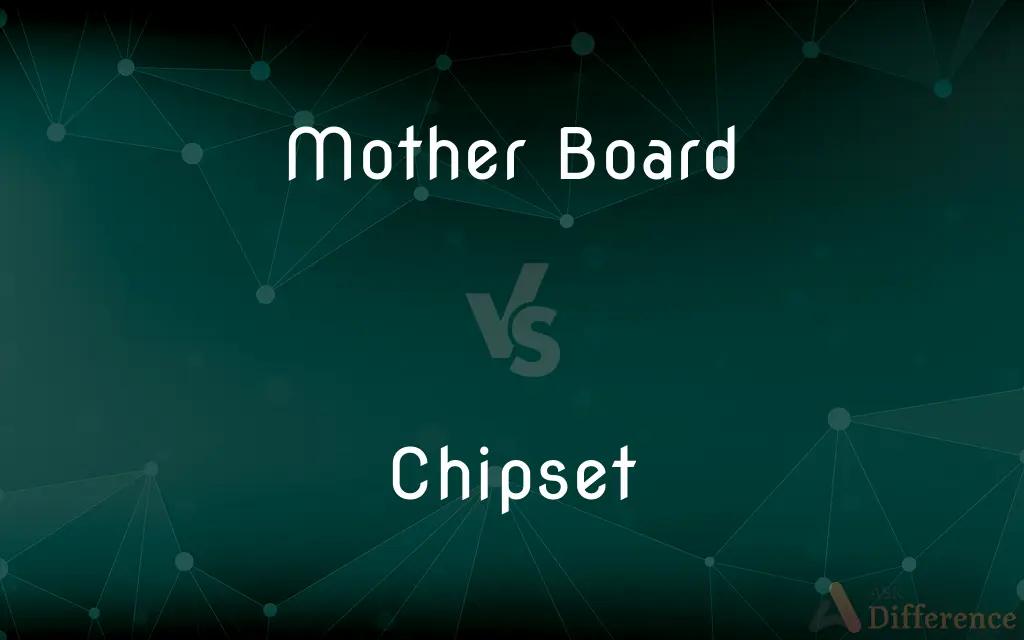Mother Board vs. Chipset — What's the Difference?
Edited by Tayyaba Rehman — By Fiza Rafique — Published on December 4, 2023
The motherboard is the main circuit board housing various components of a computer, while the chipset is a group of integrated circuits on the motherboard that manages data between the processor, RAM, and other components.

Difference Between Mother Board and Chipset
Table of Contents
ADVERTISEMENT
Key Differences
The motherboard, often referred to as the mainboard or system board, is the primary circuit board in a computer or other electronic device. It provides the foundation for housing and connecting various integral components, such as the central processing unit (CPU), memory (RAM), and storage devices. The motherboard has multiple slots, ports, and connectors to facilitate communication and power among these components.
The chipset, on the other hand, is a set of integrated circuits (ICs) embedded on the motherboard. It plays a crucial role in determining how different components of the computer interact and communicate with each other. Specifically, the chipset acts as a communication hub and controller, overseeing the data flow between the CPU, memory, graphics interface, and input/output devices.
A motherboard's design, layout, and functionality largely depend on its chipset. The compatibility of certain processors, RAM types, and even expansion slots can be dictated by the chipset on the motherboard. Therefore, when selecting a motherboard for building or upgrading a computer, understanding the chipset is crucial, as it will influence the overall performance and capabilities of the system.
Conversely, while the chipset is vital for functionality, it cannot operate independently without being part of a motherboard. The motherboard serves as the foundation, supplying power, structure, and the necessary pathways for the chipset to communicate with other components.
In essence, while both the motherboard and chipset are closely interrelated and vital for a computer's operation, their roles are distinct. The motherboard is the all-encompassing platform, while the chipset is the traffic director, ensuring efficient communication between computer components.
ADVERTISEMENT
Comparison Chart
Primary Function
Provides foundation and connection for computer components.
Manages data communication between computer components.
Component Type
Main circuit board of a computer.
Set of integrated circuits on the motherboard.
Dependency
Can house various chipsets, CPUs, RAM types, etc.
Always part of a motherboard.
Influence on Compatibility
Depends on its chipset for compatibility with CPUs and RAM.
Dictates CPU, RAM, and expansion slot compatibility.
Physical Presence
Large board with slots, ports, and connectors.
Series of chips or ICs embedded on the motherboard.
Compare with Definitions
Mother Board
Provides pathways for communication and power.
The motherboard distributes power to all connected components.
Chipset
A set of integrated circuits on the motherboard.
The chipset determines how well the CPU and RAM communicate.
Mother Board
Contains essential firmware like the BIOS.
You might need to update your motherboard's BIOS for newer components.
Chipset
Typically categorized into northbridge and southbridge (in older architectures).
The northbridge part of the chipset handles high-speed communication.
Mother Board
The primary circuit board in a computer.
I need to replace the motherboard in my old desktop.
Chipset
Influences compatibility with CPUs and RAM.
The new processor requires a motherboard with a compatible chipset.
Mother Board
Can come in various form factors and designs.
I'm looking for a mini-ITX motherboard for my compact build.
Chipset
Modern chipsets integrate more functions into a single chip.
This laptop's chipset supports Wi-Fi 6 and Thunderbolt 4.
Mother Board
The foundation for housing computer components.
The new graphics card will fit into the expansion slot on the motherboard.
Chipset
Manages data flow within the computer.
For faster SSD speeds, ensure your chipset supports NVMe.
Chipset
(computing) A group of integrated circuits ("chips") that are designed to work together, and are usually marketed as a single product.
Common Curiosities
What function does the chipset serve?
The chipset manages and oversees data communication between the CPU, memory, and other computer components.
What's the primary role of a motherboard?
The motherboard serves as the main circuit board, housing and connecting various computer components.
Why is the chipset important when choosing a motherboard?
The chipset dictates compatibility with CPUs, RAM types, and other features.
Can a faulty chipset impact my computer's performance?
Yes, a malfunctioning chipset can lead to system instability or performance issues.
How do I find out which chipset my motherboard has?
You can check the motherboard's specifications, use software tools, or look on the motherboard itself.
Can I use any chipset with any motherboard?
No, chipsets are designed for specific motherboards and are not interchangeable.
Can I upgrade the chipset on my motherboard?
No, chipsets are soldered onto the motherboard and can't be replaced individually.
Does the chipset affect gaming performance?
Indirectly, it can, by determining RAM speeds, CPU compatibility, and other features.
How long does a typical motherboard last?
With proper care, motherboards can last for several years, often outlasting other components.
Are all motherboards of the same size?
No, motherboards come in different form factors like ATX, microATX, and mini-ITX.
Share Your Discovery

Previous Comparison
Butcher Paper vs. Freezer Paper
Next Comparison
Affirmative Sentences vs. Assertive SentencesAuthor Spotlight
Written by
Fiza RafiqueFiza Rafique is a skilled content writer at AskDifference.com, where she meticulously refines and enhances written pieces. Drawing from her vast editorial expertise, Fiza ensures clarity, accuracy, and precision in every article. Passionate about language, she continually seeks to elevate the quality of content for readers worldwide.
Edited by
Tayyaba RehmanTayyaba Rehman is a distinguished writer, currently serving as a primary contributor to askdifference.com. As a researcher in semantics and etymology, Tayyaba's passion for the complexity of languages and their distinctions has found a perfect home on the platform. Tayyaba delves into the intricacies of language, distinguishing between commonly confused words and phrases, thereby providing clarity for readers worldwide.













































